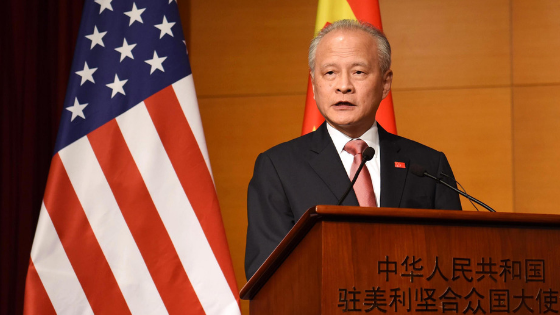Editors note: Beware slow walking. Trade Ambassador Lighthizer knows this risk.
Cui Tiankai says aspects requiring legislation could take ‘five to 10 years’, although some requested measures tally with Beijing’s own plans. Ambassador sees US action against Huawei as separate issue to trade talks but calls pursuit of the Chinese company ‘stupid’ and ‘absurd’
[Owen Churchill Wendy Wu | February 28, 2019 | South China Morning Post]
Structural reforms to China’s economic and trade policies being pushed by the United States could take years to enact, Beijing’s ambassador to Washington said on Wednesday.
Cui Tiankai, the Chinese ambassador to the US, also hit out at the US government’s criminal action against Chinese telecoms company Huawei, calling it “very stupid” and “absurd”.
Discussing recent trade negotiations, Cui told the South China Morning Post that while certain commitments such as purchases of US goods could be realized in a short time frame, other reforms that would have to go through China’s legislative process could take anywhere from “five to 10 years” to accomplish.
When asked to specify which areas of reform in particular could take multiple years to address, Cui did not elaborate, but said there were demands that were “in line” with Beijing’s own long-term plans for economic reform.
There were “different time frames for different issues”, the ambassador said, adding that the question remained “how far and how fast we can go in a period of time”.
Cui, who has been China’s chief envoy to the US since 2013, said he hoped that Washington would be tolerant of Beijing’s need for time to realize certain reforms given the US government’s respect for “due process”.
Negotiations last week in Washington, in which Cui took part, left the two countries closer to a deal than ever before, although the ambassador emphasized that he was not intimately involved in some of the detailed discussions.
When asked what Beijing had demanded of Washington in return, Cui said “they should not raise more barriers for Chinese investment”.
“And honestly, they should not treat Huawei like this,” he said. “It’s very unfair.”
In recent months the smartphone manufacturer has been hit by an onslaught of US governmental actions, including indictments against its chief financial officer Sabrina Meng Wanzhou, who is on bail in Vancouver awaiting an extradition hearing on charges of financial fraud aimed at skirting US sanctions on companies doing business with Iran.
The issue of Huawei was not part of the ongoing trade negotiations, Cui later clarified, saying: “It’s a separate issue.
“But still, it’s not fair, and it’s very strange, very absurd.” People in the American administration were “travelling all around the world trying to stop people from buying things from Huawei”, he said. “This is very narrow-minded and very stupid.”
Cui made his remarks to the Post on the sidelines of a reception hosted by diplomatic consulting firm McLarty Associates, at which Cui had earlier told guests that there were people “in high political and government places” who were “trying very hard to spread suspicion and fear”.
“There are also people who are trying to sell conspiracy theories,” he said, without naming a country.
The US-China relationship must not “return to the cold war, and cannot return to the traditional rivalry of major powers in the 19th or 20th century”, he said, calling on both sides to build a “shared vision” and a “shared community”.
On Friday, US President Donald Trump breathed new life into suspicions that Huawei would become a bargaining chip in trade negotiations, saying at the White House that “we’re going to be discussing all of that during the course of the next couple of weeks” when asked whether he would consider dropping criminal charges against Huawei.
“We’ll be talking about it,” he said. “We may or may not include that in this deal.”
Read the original article here.













